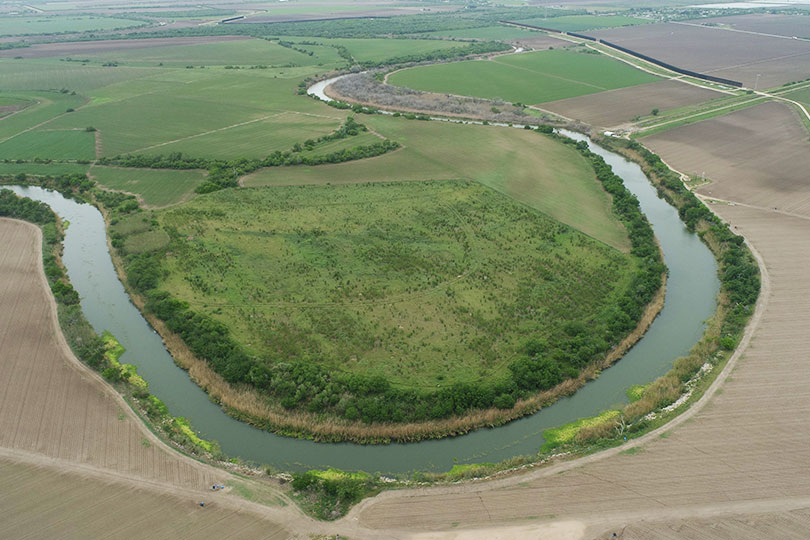By Jessica Domel
Multimedia Reporter
Lawmakers and agricultural organizations, including Texas Farm Bureau (TFB), continue to urge the Biden administration to take action to ensure Mexico delivers the water it owes the U.S. that is vital to farmers, ranchers and communities in the Rio Grande Valley.
In a recent letter to the U.S. Trade Representative’s (USTR) Office, U.S. Reps. Monica De La Cruz and Jodey Arrington, both of Texas, requested USTR Katherine Tai’s assistance in holding Mexico accountable for their responsibility outlined in the 1944 Water Treaty.
“In 1944, the United States signed a treaty with the Mexican government to receive an average of 350,000-acre feet of water from Mexico every year over a five-year cycle. For over 30 years, there have been consistent delays in meeting these obligations, which have severely affected U.S. agriculture,” De La Cruz and Arrington wrote.
Earlier this year, Rio Grande Valley Sugar Growers announced the closure of the state’s only sugar mill, which had been in operation for more than 50 years, because its growers did not have the water they need to produce sugarcane.
“This water crisis is crippling our agricultural producers and jeopardizing our local economy. With the loss of the last operating sugar mill in Texas resulting in 500 job cuts and potentially devastating the citrus industry, it is imperative that we address this issue without delay,” De La Cruz said.
Currently, Mexico owes the United States more than 750,000 acre-feet of water under the treaty, which De La Cruz notes is the most they have ever owed at this point in the five-year cycle.
“For South Texas, which is already experiencing dire drought conditions, it is imperative that immediate action is taken to mitigate the impact on the agricultural industry and our communities,” the lawmakers wrote.
Last month, De La Cruz, Sen. John Cornyn and Reps. Tony Gonzales, Henry Cuellar and Vicente Gonzalez, all of Texas, spoke with Secretary of State Antony Blinken about the water issue.
The meeting followed the passage of House Resolution 683, which De La Cruz said expresses support for diplomatic relations required to encourage the Mexican government to fulfill its annual water delivers to the United States under the treaty between the United States and Mexico.
The legislation mandates the secretary of state to leverage the full spectrum of U.S. diplomatic tools, including voice, vote, diplomatic capital and resources, to enforce Mexico’s compliance.
According to Politico, Cornyn is working to withhold U.S. funds for Mexico in the State Department’s budget if Mexico does not deliver the water owed to the U.S.
TFB coordinated a meeting between Rio Grande Valley farmers and the International Boundary and Water Commission, U.S. Department of State, National Security Council, U.S. Department of Agriculture, U.S. Bureau of Reclamation and White House staff to discuss the ongoing issue.
The 1944 Water Treaty is one of TFB’s priority issues for this Congressional session.
“The Lower Rio Grande Valley and Valley agriculture as we know it is in the crosshairs here. Essentially if something isn’t done, and they don’t get the water that they need, it’s going to be gone,” Laramie Adams, TFB associate director of Government Affairs, said. “That treaty specifically states that Mexico owes an annual allotment of water to Texas. They have failed to abide by that treaty for many, many years, and nothing’s been done about it. Our leaders in the United States have to get tough on this issue and stand up to Mexico and demand that we get the water that we need down in the Lower Rio Grande Valley.”
De La Cruz said farmers may also lose the ability to grow other commodities if something isn’t done soon.
“What I’m hearing from our citrus farmers is that they’re going to be absolutely devastated and may not survive the next three months. Think about that,” De La Cruz told TFB members on a visit to D.C.
Ryan Weston, Washington representative for Rio Grande Valley Sugar Growers, told the TFB Radio Network the closure of the sugar mill should be a wake up call.
“It’s getting to the point 837,000 acre feet are now owed to the U.S. farmers. That’s crazy when you consider 350,000 acre feet of water a year should be coming,” Weston said. “We could still be in business. We could still be growing. When the U.S. government is not standing up for U.S. farmers, it really makes people shake their head.”
Even if Mexico finally complies with the terms of the treaty and delivers the water owed to the U.S., it’s unlikely the sugar mill in the Valley will re-open.
“Historically, once a mill starts having to sell off all of the equipment, they use everything inside the mill to make sugar, it’s a lot of money to reinvest and start back up,” Weston said. “It’s much easier to keep going than to restart up and go find the capital to do that again.”
Weston encouraged people to contact their lawmakers about the water issue.
“Let them know this is important. These jobs are important,” Weston said. “If you want your food grown in the United States, you need to make sure your government is supporting farmers in the United States.”


Leave A Comment